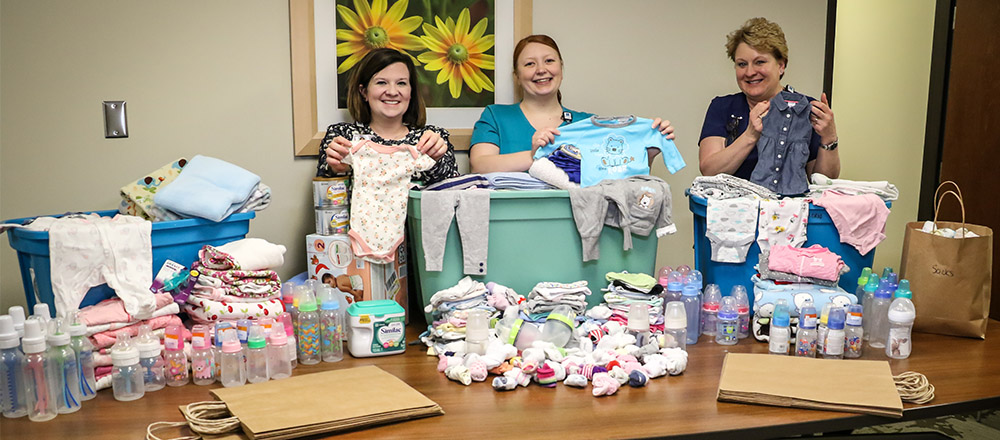
Maternity
At North Kansas City Hospital, we are here for you through every step of this precious and exciting experience.
Planning to have a baby is an exciting time of life. Picking out baby names. Designing a nursery. And preparing your heart to welcome a new member into your family. Yet if you’re like 78% of women who are pregnant or planning to become pregnant, you may be anxious about the risk of birth defects.
Luckily, pregnancy risks are generally low, especially for healthy women. In fact, about 97 out of every 100 babies in the United States is born without a major birth defect — and those born with one can often be treated.
Risk factors for having a baby with a birth defect include having diabetes, epilepsy, obesity, or drinking or smoking during pregnancy. Still, the cause isn’t known in roughly 70% of all cases.
“That’s why it’s important to act like you’re pregnant as soon you decide you want to conceive,” said Brian Lovitt, DO. “Most birth defects develop early on when the brain and spinal cord are forming.”
Here are five actions you can take to prevent birth defects.
1. Schedule a preconception visit.
One of the first things you should do before trying to conceive is schedule a preconception appointment with an OB-GYN. That way, you can review your medical history with a trusted healthcare professional and go over treatment plans for any existing conditions (like diabetes).
You can also discuss the medications you’re taking. While many medicines are safe to continue during pregnancy, some have been linked to birth defects. But it’s important to consult with your doctor before you stop taking any your prescribed medications. In some cases, stopping medications abruptly can be more harmful to a developing baby than continuing to take it.
Your doctor will also talk with you about common over-the-counter drugs, like pain relievers and allergy medicines, to be sure you know what’s safe to take during pregnancy.
2. Take folic acid.
Adding 400 micrograms (mcg) of folic acid to your daily vitamin intake can help prevent major birth defects in your baby’s brain and spinal cord. And it’s important to start taking it before becoming pregnant since defects, such as anencephaly and spina bifida, develop in early pregnancy.
You can also look for sources of folic acid in your food — it’s in some breads, breakfast cereals and corn masa flour.
3. Make sure you’re up to date on your vaccines.
Infections such as measles, mumps and rubella (MMR), varicella (chicken pox) and the flu can cause major birth defects during pregnancy. That’s why it’s so important to consider all recommended vaccines. But since some of these vaccines aren’t safe to get during pregnancy, you’ll need to make sure you’re up to date on your vaccines before getting pregnant.
4. Aim for a healthy weight.
It’s best if you’re at a healthy weight before you conceive since women who are obese before pregnancy (at a body mass index of 30 or higher) are at a greater risk for complications, especially heart and spine problems and cleft palates.
Getting to a healthy weight can also help boost your mood and overall well-being. If you’re concerned about your weight, ask your doctor for guidance during your preconception visit.
5. Avoid alcohol, tobacco and other drugs.
Harmful substances can be passed on to your baby during pregnancy, including:
- Alcohol is delivered to the baby through the umbilical cord and can cause miscarriage, stillbirth and a range of lifelong disabilities — from physical to behavioral to intellectual. There is no known safe amount of alcohol to drink during pregnancy, and all types of alcohol can cause harm.
- Tobacco can cause preterm birth, low birth weight, a cleft lip or palate and sudden infant death syndrome (SIDS). These dangers are also possible from just being exposed to tobacco smoke during pregnancy.
- Marijuana and other drugs, especially early in pregnancy, can cause preterm birth, low birth weight and stillbirth. No amount of any recreational drug is considered safe during pregnancy.
If you’re using marijuana for medical reasons, speak with your doctor about an alternative therapy before becoming pregnant.
Keep your focus where it belongs.
Taking these steps will help increase your chances of having a healthy baby — not to mention giving your baby the best possible start. And you can rest easy knowing you’ve done all you can to improve not only your baby’s health, but also your own.
Explore More
Your Guide to Finding the Right OB-GYN
Vaccines Vital for Pregnant Women
Great Expectations



